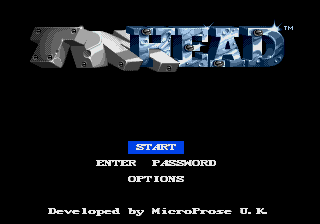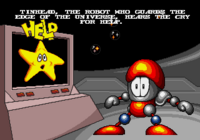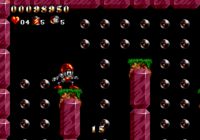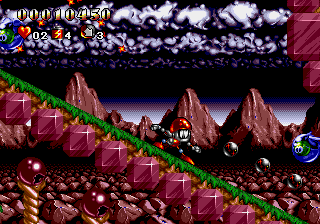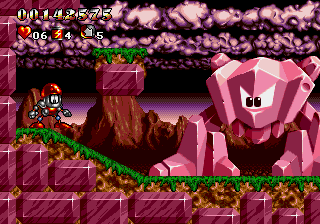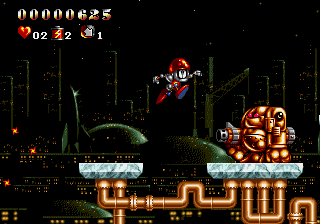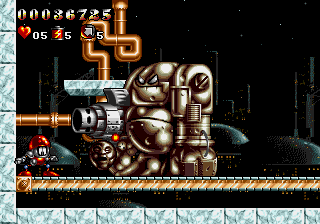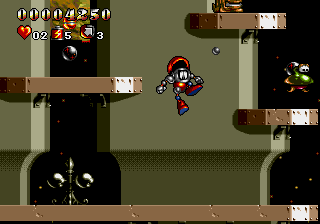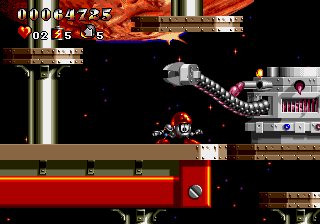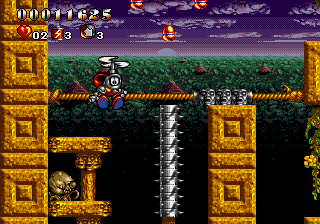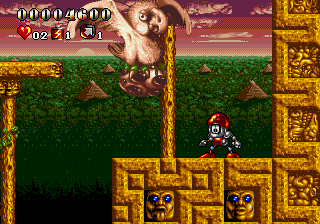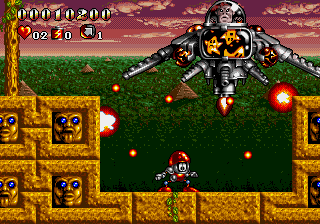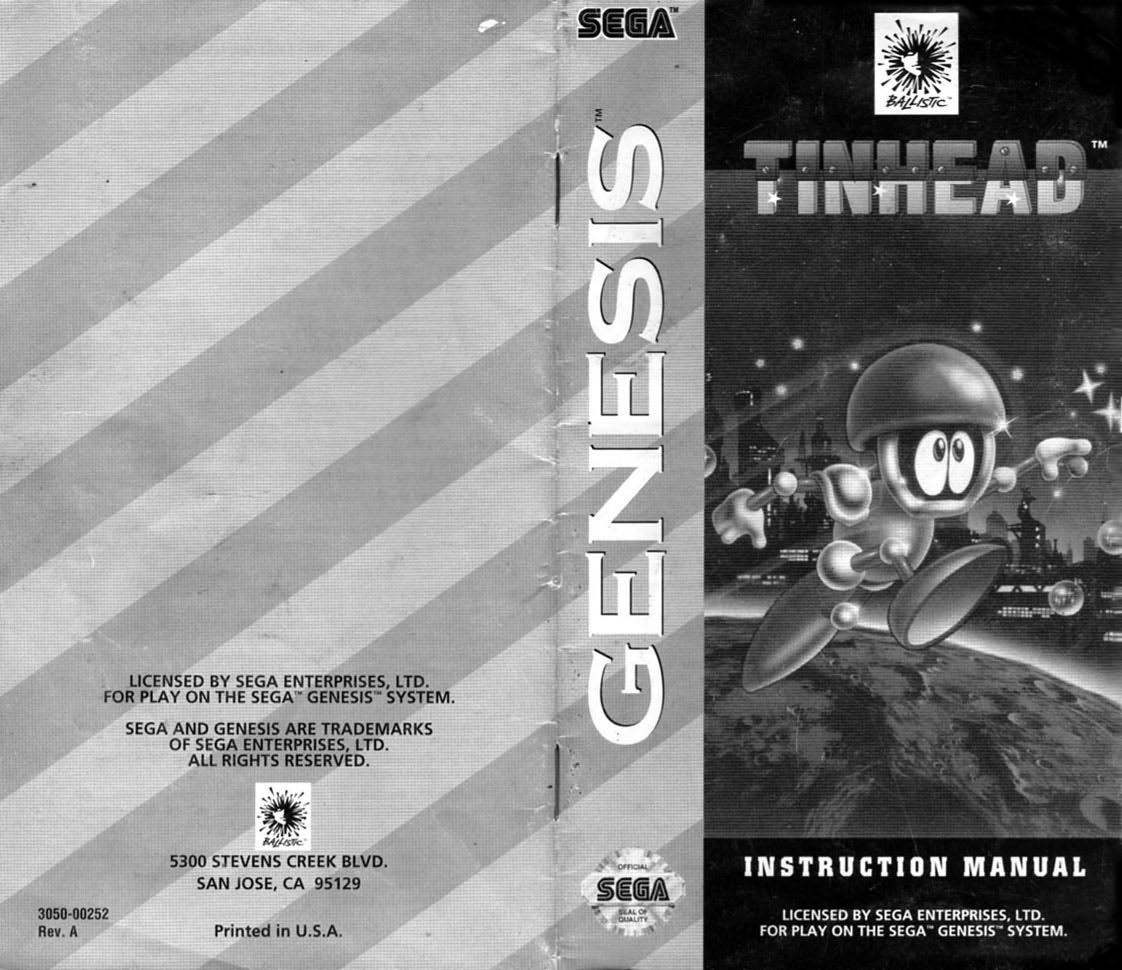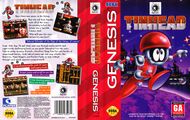Difference between revisions of "Tinhead"
From Sega Retro
m (Text replacement - "==Technical information== ===" to "==Technical information== {{mainArticle|{{PAGENAME}}/Technical information}} ===") |
|||
| Line 237: | Line 237: | ||
==Technical information== | ==Technical information== | ||
{{mainArticle|{{PAGENAME}}/Technical information}} | {{mainArticle|{{PAGENAME}}/Technical information}} | ||
| − | |||
| − | |||
| − | |||
| − | |||
==References== | ==References== | ||
Revision as of 11:04, 22 April 2023
| Tinhead | |||||||||||||||
|---|---|---|---|---|---|---|---|---|---|---|---|---|---|---|---|
| System(s): Sega Mega Drive | |||||||||||||||
| Publisher: Ballistic, Spectrum HoloByte | |||||||||||||||
| Developer: MicroProse | |||||||||||||||
| Sound driver: Sound Images v1.5 | |||||||||||||||
| Genre: Action | |||||||||||||||
| Number of players: 1 | |||||||||||||||
|
Tinhead is a 1993 run-and-gun platformer developed by MicroProse and published by Ballistic. It was released exclusively in the US for the Sega Mega Drive. The game was re-released the following year, now with Spectrum HoloByte responsible for publishing. Plans appear to have been in place at one stage to bring it to Europe, where it was set to appear in March 1994.
Contents
Story
An evil intergalactic goblin named Grim Squidge steals all the stars from the sky with a vacuum cleaner-nosed spaceship, seals them in glass spheres, and scatters them far and wide across distant planets, threatening the very infrastructure of spacetime.
On a space station far out in the distant reaches of galactic space, Tinhead, the metallic Guardian of the Edge of the Universe, picks up a distress signal from an unknown friend of the stars. Arming his head-mounted ball bearing gun, he rushes to the stars' rescue.
Gameplay
The game is a platformer where the player controls a robot named Tinhead, who has to rescue the stars of the galaxy. The goal of each level is to find the Lucky Star to activate the Transporter and then move Tinhead into the Transporter to move to the next level. Along the way, Tinhead collects items, including Crystal Globes containing stars to free, and fights enemies. Tinhead can also occasionally find vehicles that he can ride to help him travel through the level.
Tinhead moves with ![]() and
and ![]() and ducks with
and ducks with ![]() . He jumps with
. He jumps with ![]() and jumps longer if the button is held for longer. The player can pan the view to see potential hazards by pausing the game with START and moving the D-Pad. His method of attack is shooting ball bearings from under his helmet with
and jumps longer if the button is held for longer. The player can pan the view to see potential hazards by pausing the game with START and moving the D-Pad. His method of attack is shooting ball bearings from under his helmet with ![]() (which can be held for continuous fire). This attack can be launched in three different directions: diagonally up, straight forward, or diagonally downward. The player can cycle through the directions with
(which can be held for continuous fire). This attack can be launched in three different directions: diagonally up, straight forward, or diagonally downward. The player can cycle through the directions with ![]() . Tinhead can attack while ducking or jumping. Balls bounce off surfaces and roll along the ground. Normally, Tinhead can only shoot one ball at a time, but he can find items that upgrade his maximum balls as high as five.
. Tinhead can attack while ducking or jumping. Balls bounce off surfaces and roll along the ground. Normally, Tinhead can only shoot one ball at a time, but he can find items that upgrade his maximum balls as high as five.
Levels contain secret rooms where the player can earn bonus points by collecting items. Tinhead exits the secret room when time runs out or when he enters the Transporter. Additionally, the player is awarded bonus points at the end of each sector for each secret room found as well as special bonuses if the player completes the sector without taking any damage or if every shot fired by Tinhead hits an enemy.
Tinhead's health is measured in batteries, up to a maximum of five. If he takes damage from an enemy or a hazard while riding a vehicle, he loses the vehicle; otherwise, he loses a battery as well as reducing his maximum number of shots (to a minimum of one). When he loses all of his batteries, he can only sustain one more hit before he loses a life and must restart the level from the beginning.
There are two difficulty levels, Normal and Practice. The Practice difficulty shortens the game by removing half of the levels and world guardians. The game has a password system for continuing.
Items
Each world contains an assortment of unique items that award bonus points.
| Crystal Globe | |
|---|---|
| Tinhead finds stars in globes and releases them back into the galaxy. The player earns points for collecting globes. | |
| Metallic Orb | |
| Contains another item. Open by moving Tinhead over it. | |
| Battery | |
| Restores a battery, Tinhead's unit of health, up to a maximum of 5. Tinhead loses a battery each time he is hit by an enemy or hazard. | |
| Spark | |
| Fully restores Tinhead's batteries to the maximum of 5. | |
| Shot Globe | |
| Increases the number of simultaneous balls that Tinhead can have out at a time, up to a maximum of 5. Tinhead loses a shot each time he is hit by an enemy or hazard. | |
| Heart | |
| Gives the player an extra life. | |
| Secret | |
| Transports Tinhead to a secret room, where he can collect items for bonus points. | |
| Hyper Hopper | |
| Gives the Hyper Hopper vehicle to Tinhead. | |
| Rocket Pack | |
| Gives the Rocket Pack vehicle to Tinhead. | |
| Gyrocopter | |
| Gives the Gyrocopter vehicle to Tinhead. | |
| Unicycle | |
| Gives the Hyper Hopper vehicle to Tinhead. | |
| Lucky Star | |
| Activates the Transporter to exit the level. |
Vehicles
Vehicles help Tinhead traverse the levels, but he loses his vehicle if he takes any damage.
Worlds
The game is divided into four worlds, each containing three sectors that are further divided into two levels. A password is given after each sector. The last sector of every world ends with a fight against a world guardian.
| Crystal World | |
|---|---|
| Space Port | |
| Star Hulk | |
| Intec Planet | |
History
Development
According to producer Stuart Whyte, the game was originally called Waldo during development.[2]
Legacy
The Super NES version of the game was released on Steam in 2022 by Piko Interactive.
Versions
Ports for both the Amiga and Super NES were in development and scheduled for 1994 but were cancelled.[3] A Jaguar conversion of the game was also in development and completed but was never released due to low sales of the system.[4][5]
A ROM image of the SNES version has leaked and appears to be complete. This version uses a screen size of 256x224 compared to the 320x224 of the Mega Drive version, so the field of view is narrower and the art is stretched horizontally. Since the SNES controller has more buttons than a standard Mega Drive control pad, each direction of Tinhead's shot is mapped to a different button and the player can pan the view using the shoulder buttons during gameplay.
Production credits
- Programming: Nick Thompson, Paul Dunning, Jim Gardner, Chris Newcombe
- Graphics: Trevor Slater, Theo Pantaze, Mark Wilson, Paul Ayliffe, Allan Holloway, John Reitze
- Game Design and Maps: Richard Lemarchand
- Quality Assurance: Jason Sampson, Darren Kirby, Robert Husband
- Music & Sound Effects: Paul Tonge
- Graphics Technician: Seth Walker
- Producer: Stuart Whyte
- Thanks to: Paul Hibbard, Peter Moreland, Andy Hieke, Rob Northern, Everyone at MPS U.S., WALDO
- Producer: Harvey Lee
- Quality Assurance: Marjorie DeWilde
- Lead Tester: Robert Wong
- Testers: Garth Gurley, Randy Lee, Sean McKenna, Hart Nelson, Wi Kian Tang, Sergio Vuskovic, Larry Webber
- Instruction Manual: Robert Giedt
- Graphic Services: Carrie Galbraith, Lucija Kordié, Jerome Paterno
- Product Marketing: Tom Byron
- Special Thanks: Kurt Boutin, Pat Feely, Clyde Grossman, Gilman Louie, Kathryn Lynch, Martin Moth, Marisa Ong, Ann Pratt, Stan Roach
Magazine articles
- Main article: Tinhead/Magazine articles.
Physical scans
| Sega Retro Average | ||||||||||||||||||||||||||||||||||
|---|---|---|---|---|---|---|---|---|---|---|---|---|---|---|---|---|---|---|---|---|---|---|---|---|---|---|---|---|---|---|---|---|---|---|
|
| 63 | |
|---|---|
| Based on 6 reviews | |
Technical information
- Main article: Tinhead/Technical information.
References
- ↑ GamePro, "April 1994" (US; 1994-xx-xx), page 88
- ↑ https://www.angelfire.com/yt2/stuwhyte/microprose/Tinhead/Tinhead.htm (Wayback Machine: 2011-03-08 05:04)
- ↑ https://snescentral.com/article.php?id=0956
- ↑ https://archive.org/details/AtariEntertainment/page/n13/mode/1up
- ↑ https://forums.atariage.com/topic/3862-how-hard-is-it-to-make-jag-games/#comment-35706
- ↑ File:Tinhead MD US Manual Ballistic.pdf, page 13
- ↑ 1700 igr dlya Sega, "" (RU; 2001-xx-xx), page 244
- ↑ Electronic Gaming Monthly, "July 1994" (US; 1994-xx-xx), page 38
- ↑ Entsiklopediya luchshikh igr Sega. Vypusk 1, "" (RU; 1999-xx-xx), page 363
- ↑ Mega Play, "August 1994" (US; 1994-0x-xx), page 63
- ↑ Tricks 16 bit, "Tricks Sega Gold 800 igr" (RU; 1998-03-20), page 201
- ↑ VideoGames, "September 1994" (US; 1994-0x-xx), page 72
| Tinhead | |
|---|---|
|
Main page | Maps | Hidden content | Magazine articles | Video coverage | Reception | Region coding | Technical information | Bootlegs | |
